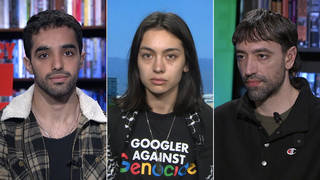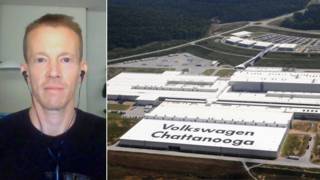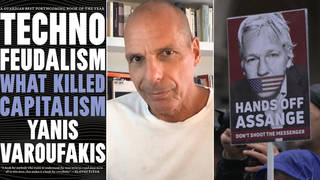
Related
Texas Gov. Rick Perry was back on the campaign trail at last night’s Republican presidential debate, where he questioned the science behind human-caused global warming. On Wednesday, Perry announced he was returning home to focus on a historic wildfire season in which some 3.6 million acres have burned—an area larger than the size of Connecticut. Perry has used the crisis to complain the federal government is not acting fast enough to assist firefighters, but critics have been quick to note the governor has slashed the budget for the Texas Forest Service, the first line of fire defense for most of the state. The wildfires come amidst a record drought. The state has seen its driest consecutive months since record keeping began in 1895, and the impact on the state’s agricultural industry has been devastating. We speak with Forrest Wilder, reporter with The Texas Observer. His latest article on this is “Texas’ Permanent Drought: Our Water Deficit Didn’t Start with this Drought. And It Won’t End with this Drought.” [includes rush transcript]
Transcript
JUAN GONZALEZ: Texas Governor Rick Perry was back on the campaign trail at last night’s Republican presidential debate after announcing on Monday that he was returning home to focus on massive wildfires raging across much of his state. He spoke at a town hall meeting in South Carolina.
GOV. RICK PERRY: Our state has got wildfires that are running quite wild, and zero containment right now. And the winds are supposed to pick up again. So, just keep those folks in your prayers, if you will, as we go back and try to get people out of harm’s way and get our state—pray for rain, as well.
JUAN GONZALEZ: Perry went on to participate in his first Republican presidential debate last night, where he questioned the science behind global warming, and former governor—former Utah Governor Jon Huntsman repeated his criticism of Republicans who are climate change deniers.
JON HUNTSMAN: When you make comments that fly in the face of what 98 out of 100 climate scientists have said, when you call into question the science of evolution, all I am saying is that in order for the Republican Party to win, we can’t run from science, we can’t run from mainstream conservative philosophy. We’ve got to win voters.
JOHN HARRIS: Governor Perry, Governor Huntsman was not specific about names, but the two of you do have a difference of opinion about climate change. Just recently in New Hampshire, you said that weekly, or even daily, scientists are coming forward to question the idea that human activity is behind climate change. Which scientists have you found most credible on this subject?
GOV. RICK PERRY: Well, I do agree that there is—the science is not settled on this. The idea that we would put Americans’ economy at jeopardy based on scientific theory that’s not settled yet, to me, is just—is nonsense. I mean, it—I mean, and I tell somebody—I said, “Just because you have a group of scientists that have stood up and said, 'Here is the fact'” — Galileo got outvoted for a spell. But the fact is, to put America’s economic future in jeopardy, asking us to cut back in areas that would have monstrous economic impact on this country, is not good economics, and I will suggest to you, is not necessarily good science.
JUAN GONZALEZ: That was first former Utah Governor Jon Huntsman and then Texas Governor Rick Perry at last night’s Republican debate.
Texas is in the midst of a historic wildfire season in which some 3.6 million acres have burned. That’s an area larger than the size of Connecticut. Thousands of acres of forests and park land have succumbed to the blaze, and as many as 800 homes have been destroyed. The latest series of wildfires flared up over Labor Day weekend, and more than 50 are now burning throughout the state.
Critics have been quick to note that Perry slashed funding for the agency responsible for fighting wildfires. Meanwhile, Perry has complained the federal government has failed to devote enough time and money to the crisis. On Wednesday, Perry tweeted, quote, “Better weather allowing partial containment of Bastrop fire. Pushing for more federal assets (dozers/bladed equipment) to cut fire guards,” unquote. The U.S. Forest Service and National Interagency Fire Center are currently commanding firefighting efforts near Bastrop. President Obama called his potential 2012 rival on Wednesday to assure him that requests for assistance would be quickly assessed.
AMY GOODMAN: The Texas wildfires come amidst a record drought. The state’s seen its driest consecutive months since record keeping began in 1895, and the impact on the state’s agricultural industry has been devastating.
For more, we go to Austin. We’re joined by Forrest Wilder. He’s a reporter with The Texas Observer. His latest article is “Texas’ Permanent Drought: Our Water Deficit Didn’t Start with this Drought. And It Won’t End with this Drought.”
Welcome to Democray Now!, Forrest. Let’s start with the presidential debate last night and Governor Perry’s comments on climate change, once again saying—well, basically calling the whole idea of global warming a hoax. Talk about what’s happening in your state.
FORREST WILDER: Well, you know, this is classic Rick Perry. He’s been saying this about climate change and climate science for some time now. In his book, Fed Up!, he—for example, he calls Al Gore the leader of a “secular carbon cult.” He says that every day there are more and more scientists who are sort of leaving the fold and coming forward and saying that climate change is not actually occurring. He suggests in the book also, as he has before, that we may actually be in a global cooling trend, which is news for us here who have had the hottest summer on record and the driest summer on record, and literally the state is burning up. As you point out, there have been several million acres that have been lost here. We’ve got wildfires at the doorstep of Austin right now, which is unprecedented. You know, 800 homes have been lost. And so, this is really a historic event for us. And it’s not over yet, unfortunately.
JUAN GONZALEZ: But yet, in last night’s debate, when he was pressed on the question of what scientist is he relying on or what’s the science that he thinks is counter to the viewpoint, the general viewpoint, that global warming is a huge reality, he didn’t have any answer. He seemed to stumble.
FORREST WILDER: That’s right. And in fact, you know, at one point some time ago, I asked his—the governor’s office for a list of scientists, because they keep—they’ve been saying this for a while, he and his people, that there’s these—there’s scientists out there that are leaving the pack and suggesting that climate change is not real. What I got was a list from—that had been produced by a guy named Marc Morano, which is—he’s a leading sort of climate denialist. And this is a list that’s been pretty thoroughly debunked. There’s a lot of people that are on the list, the scientists who didn’t know that they were on there and don’t share the views, meteorologists and other people who don’t really have a climate science or even a science background. So that was the only thing that I’ve seen to date that there’s any evidence of what he’s saying. Unfortunately, it’s not very good evidence. And as Huntsman pointed out, something like 97, 98 percent of scientists who have a background in climate science or related fields, you know, accept the basic understanding, the basic premise, that the climate is changing and that it’s largely caused by human activity, and presumably, we should do something about it.
AMY GOODMAN: Forrest, in your recent article on Texas’s permanent drought, you cite a recent op-ed piece by Republican State Representative Bill Callegari, who wrote, quote, “Looking forward, the ever-persistent threat of drought coupled with the absence of key pieces to our long-term water supply infrastructure could be the Achilles’ Heel of the Texas economic miracle. State water planners predict that in less than 50 years 85 percent of Texans may not have enough water. Throw in the onset of a megadrought, and our prospects look dim,” unquote. Is the drought Texas currently faces just the most visible part of something that could be a long-term water shortage?
FORREST WILDER: Yes, I think so. I mean, we’ve—Texas has always had water scarcity problems. But on top of that now, we have a booming population, a lack of investment in our infrastructure and in water conservation in a lot of places, and we have climate change. I mean, this drought is not 100 percent a climate drought. It’s not—wasn’t caused by climate change. But as the state climatologist will—has been going around saying, it’s been enhanced because we have a couple degrees of warming that have happened in this century. So, you have higher rates of evaporation, you have more heat, the drought is worse. And if you look at the climate record, for example, based on tree ring data, we’ve had megadroughts of the past that have lasted 30 to 40 years, numerous times in the past 500, 600, 700 years, that dwarf anything that we’ve seen since record keeping began in 1895.
So, yes, we’ve got the fundamental mismatch between supply, our strategies of dealing with drought, and the demand in the state. This drought is just bringing that to a head. You know, now we’ve got towns, areas of the state that are months away from running out of water. And so, we’re looking at trucking in water. We’re looking at, you know, plan B, C, D and E, to emergency plans, because we’re literally running out of water right now. And now the state climatologists are saying this drought is going to extend well into 2012. So, unfortunately, it looks like things are going to get worse before they get better, in the short term, and the midterm and the long term is, if anything, a little bit more dire, I think.
JUAN GONZALEZ: And Forrest, in terms of—you’ve been out to some of the most stricken areas—what you’ve seen, the whole issue—obviously, Texas has a huge cattle industry—what the impact is on the—especially the countryside of Texas and rivers running dry in some places?
FORREST WILDER: Yeah, I mean, for rural Texans, I mean, this is tough. I mean, people in the city, you know, we may be not watering our lawns as much. But for those people out there, the farmers and ranchers that are really important to the economy of the state, I mean, they’ve been hammered by this drought. You know, I was out in West Texas last week, and, you know, ranchers are selling off their cattle, they’re selling off their goats, they’re selling off their sheep. We went to a feedlot in San Angelo, and they said that normally people bring in their cattle to the feedlot to fatten them up before they go to market. Now they’ve got people coming in, paying top dollar for hay to feed their—to just to save their herds. Farmers have taken a huge loss. I mean, I think the losses are something on the order of $5 billion now in total. And so, for a lot of farmers and ranchers that were already sort of on the margins, barely making ends meet, this drought could be, you know, game over, game over for them. And there’s ripple effects throughout the economy. And we’ve got, you know, streams and springs are at the lowest point that we’ve seen in a very long time.
AMY GOODMAN: At a news conference in Texas, Governor Perry lashed out at the federal government for failing to help fast enough with dousing the wildfires. This is a clip of what he said.
GOV. RICK PERRY: It’s more difficult than it should be to get those types of assets freed up by the federal government. And it’s one of the things that we need to continue to work on as a country, to—when you’ve got people hurting, when you’ve got lives in danger, in particular, I really don’t care who the asset belongs to. If it’s sitting on some yard somewhere and not helping be part of the solution, that’s a problem.
AMY GOODMAN: That was Governor Perry. Forrest, can you talk about Governor Perry calling for federal aid? It’s interesting. Just before the Republican presidential debate, President Obama called Perry to talk about delivering aid to Texas. But how does Perry fit this into his politics and his world view of axing government, and also the issue of the state budget cuts for firefighters and others?
FORREST WILDER: Well, I mean, this is classic Rick Perry. You know, during an emergency, almost every time, he comes forward and bashes the federal government for not being fast enough, not sending aid quick enough, not signing the disaster—or accepting the disaster declaration fast enough. And you know, I imagine sometimes there’s probably a legitimate criticism there, but this is a governor who’s running under states’ rights, who’s running under this sort of anti-federal banner, so it’s a little ironic that, in so many instances, he’s reaching out for federal aid—that, admittedly, we absolutely do need—at the same time that he’s saying the federal government can’t do anything.
And then, in the backdrop of all this, of course, we have the budget cuts to the Texas Forest Service. They were cut, I think, about 30 percent. Now, most of that funding was for a program that provides grants to volunteer fire departments. But volunteer fire departments generally in Texas are the first line of defense, and I think about 80 to 90 percent of the state, of the service area, are protected by volunteer fire departments. And as the name suggests, these are volunteers who, a lot of times, just live off donations to buy engines, to buy equipment, to buy helmets, to buy all the things that you need to fight a fire. They got to get it through donations or through this grant program, which has been sort of drastically, drastically cut. As far as the on-the-ground effects from these cuts on these wildfires we’re having right now, I’m not sure that we’ve seen them yet, because the budget cut—our budget just went into effect on September 1. So there’s going to be—over the next two years, we’ll probably see whatever effects that we’re going to, rather than just in the past few days here.
AMY GOODMAN: Forrest Wilder, we want to thank you for being with us, staff writer at The Texas Observer. When we come back, another September 11th: September 11th, 1973. Stay with us.












Media Options